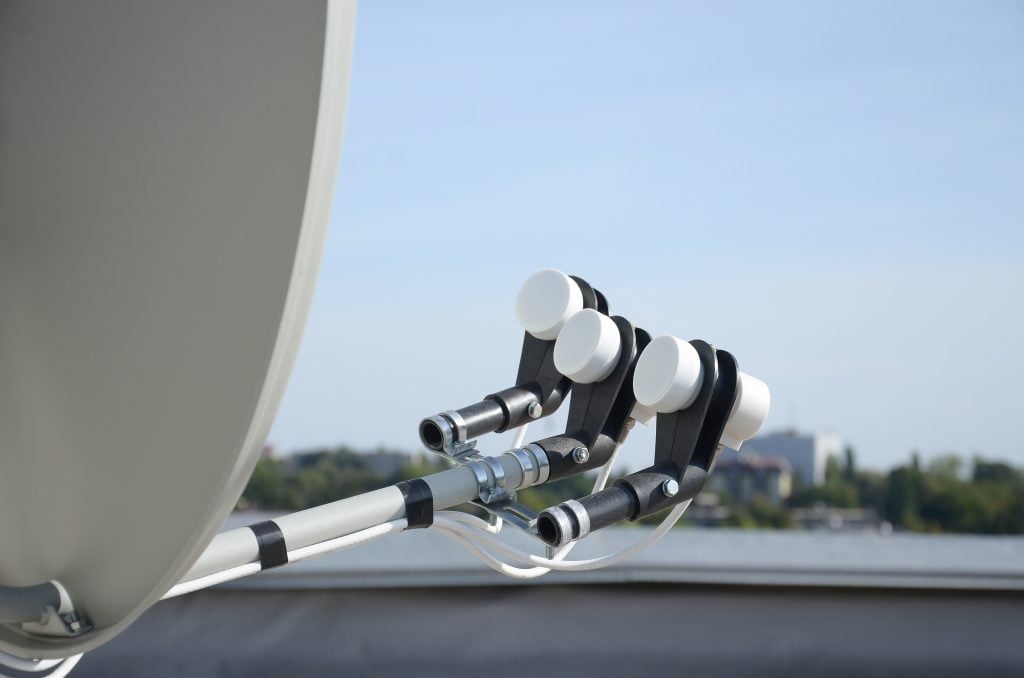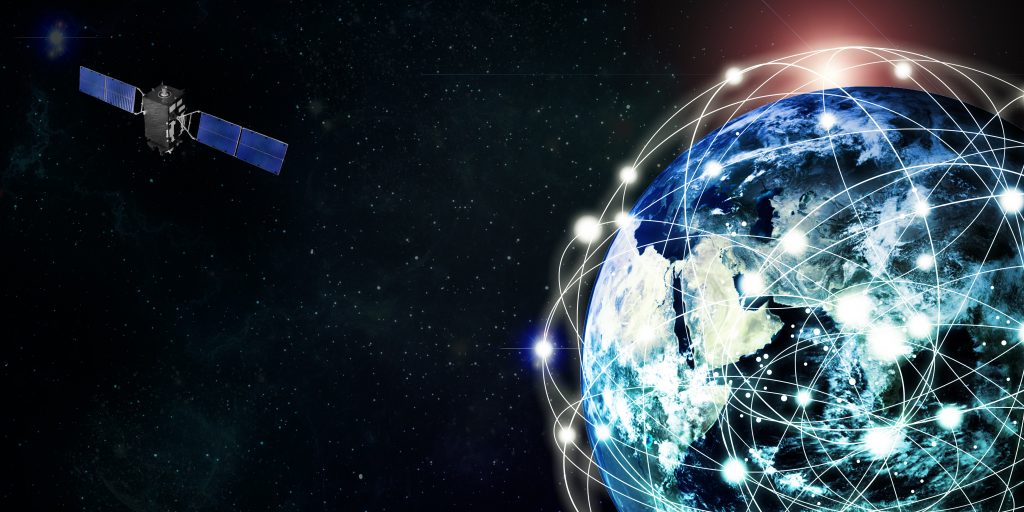Watching Netflix or getting a little bit of work done while in your RV doesn’t have to be complicated. If you’re wondering how to get internet in an RV, keep reading. We’ve got all the info you need to stay connected!
Easy Ways to Get Internet in an RV
There are several options for how to get internet in an RV, but it will depend on your needs. First, identify how you’ll use the internet. The more dependent you are on a quality connection, the more in control you’ll want to be.
Some campgrounds or resorts offer wifi, but it’s often unreliable and expensive. We’ve encountered a few unicorns during our travels in the form of campgrounds or resorts that provided decent free internet access. RVers should remember, though, that public wifi is never guaranteed. Have a backup plan.
Many RVers turn their mobile phones into hotspots or purchase designated mobile hotspots. These utilize AT&T, Verizon, and T-Mobile’s cellular networks. The distance to a cell phone tower and the amount of traffic it receives can impact the connection’s quality.
While these provide a good alternative to public wifi, be mindful of data caps, throttling, and network congestion.
Some RVers also use satellite internet. This option is currently only available to stationary RVers who aren’t using their RV to travel and are in remote areas. Orbiting satellites provide the service, which often means slower speeds and less stable connections. It can also be more expensive than other alternatives.

Public and Campground Wifi
More and more public places offer internet access. This includes everything from campgrounds to libraries to coffee shops.
Public wifi is great, but it comes with security concerns. Hackers can use these connections to gain access to sensitive information. We highly recommend that you don’t use public wifi for accessing personal or financial information.
The quality can vary widely as well. You may experience a great connection at one location but struggle at another. You’re also at the mercy of an establishment’s business hours and usage restrictions.
If you’re in a pinch, public and campground wifi can be a great option, especially if you don’t need consistent access.
Cellular Data Plan
Some RVers utilize cellular data plans for internet access via a smartphone or mobile hotspot device. These devices connect to cell phone networks via towers created by carriers like AT&T, Verizon, and T-Mobile.
Cell towers span the country, making this an attractive option for RVers. Your cell phone or mobile hotspot will connect to the network as long as the carrier has established a cell phone tower in the area. Of course, this can mean that camping somewhere remote cuts you off from the internet.
Many RVers use multiple cell phone or hotspot plans to ensure they always have coverage. The quality of the signal and connection could vary greatly from one carrier to the next. Beware of data caps and other restrictions, however.
Satellite RV Internet
One of the least common internet options for RVers is satellite internet. This option works best for users in remote locations who have limited access to cell phone networks. You may need a satellite dish to secure this type of connection.
Because of the great distance between your dish and the satellite in space, you can experience an unstable connection and slower speeds. That’s why many view this as an emergency option or last alternative.
SpaceX is working to improve this service with low-orbit satellites. Its Starlink service is currently in beta testing and may become available to the public soon. SpaceX has even sought a license from the FCC that would open up moving vehicles like RVs to Starlink service.

Public and Campground Wifi Pros
It’s always a great surprise to discover that there’s a free internet option available. Let’s look at a few other things we love about public and campground wifi.
Easily Accessible
There are several apps and resources to help you track down public wifi options. You’ll be surprised to find that even public parks are investing in their internet infrastructure. Community organizations such as churches are investing in providing wifi from their parking lots. It’s truly never been easier to access public wifi!
Free
Who doesn’t love free? While personal wifi service may require a large monthly payment and big commitment, public wifi is generally free (or very cheap). Save money and data at the same time.
Public Wifi Cons
While we love public wifi, it’s not perfect. Let’s look at a few of the cons.
Doesn’t Always Work
No technology is perfect, and the same goes for wifi. Because you’re not the administrator of the network or connection, you’re at the mercy of whoever is. Businesses will offer wifi as an amenity, but it’s not their top priority. You may find yourself having to pack up and move to a spot with a working connection.
Can’t Rely on It for Important Things
Suffering through a Zoom meeting where you only understand every other word is never fun. You shouldn’t rely on public wifi for important things since speeds can vary depending on other users’ traffic. If you require a secure and smooth connection, public wifi may not provide it.

Tips for Using Public and Campground Wifi
If you’re finding that your RV is just a little too far away from a public router, boost the signal. Wifi boosters help amplify the signal and create a more stable connection. These boosters don’t do anything to improve speeds resulting from poor internet or high traffic but will bolster a weak signal.
Cellular Data Plan Pros
Cellular data provides a ton of freedom, but that’s not all. Let’s look at a few of our favorite cellular data benefits.
Most Accessible and Popular Option
Most RVers who use the internet in their RVs rely on some sort of cellular data plan. Traveling the country and staying connected thanks to a vast network infrastructure opens all kinds of options for true nomads.
Relatively Inexpensive
Cell phone providers and other third-party resellers offer varying service plans. If you’re planning to use a larger amount of data each month, you might require a hotspot or other equipment. However, if you’re a very light user looking to respond to a few emails or posts on social media, you could get by just turning on the hotspot on your current smartphone.
Portable and Easy to Set Up
Cellular data hotspots often require minimal setup and are incredibly portable. The devices that provide the signal are often small enough to fit in the palm of your hand or even your back pocket. You can access the internet from both your RV and your tow vehicle while traveling. Plus, you can work from not only your RV but also other remote locations.

Cellular Data Cons
Cellular data is a great option for RVers, but we’re not blind to the fact that there are some difficulties. Let’s take a look!
Only Works Where You Have Signal
If you’ve ever missed a call or couldn’t send a text because there was no service, you understand what we’re talking about. You’re only going to receive a signal where the carrier has infrastructure. If you’re relying on this as your primary internet source, you’ll have to plan your adventures around where you’ll have service.
Signal boosters can help. They do a great job but don’t come cheap. They also can’t create a signal where there is none. If you’re not getting any signal, there’s very little chance a booster will fix that.
Not Unlimited
The days of unlimited cell phone data are long gone for the majority of users. A handful of RVers are grandfathered into older plans with unlimited data, but that’s certainly not all of us. You’ll need to keep an eye on your usage and avoid data-hogging services like streaming or online gaming.
Subject to Throttling
Many cellular providers will have a set amount of unrestricted data but begin throttling the connection at a certain threshold. This prevents abuse of the network and keeps users with unlimited plans from consuming massive amounts of data. However, even some everyday usage can sometimes bump into the limit.
You can be mindful of your usage and still get throttled, especially at peak usage times. You may notice this in the evening when many people are trying to stream movies and TV.

Tips for RV Internet with Mobile Data Plans
Having the best quality signal is essential if you’re relying on mobile data as your RV’s internet source. While there’s only so much you can do to improve the signal, there are a couple of tools to assist you.
We strongly encourage RVers using mobile data to invest in a cell signal booster and upgrade their antennas. Again, this will not create a signal but can turn a weak signal into a usable one.
Satellite Internet Pros
We can anticipate major strides in satellite internet in the coming years, but there are already benefits to the service.
Can Use Almost Anywhere
Because satellites orbit the earth, this option is available almost anywhere. Your dish communicates with satellites all around the planet. This is incredibly useful for those who are in very remote locations but are stationary.
Satellite Internet Cons
While satellite internet is the only option for some, it’s not a great option for the majority. Here are a few things we don’t love about satellite internet.
Slow Speeds
Due to the incredible distance between the satellite dish and the satellites in space, you can experience slow speeds. You only want to use this for lighter tasks like checking email. You’re not going to be able to download large files or stream videos.
Expensive to Set Up
Many times users are required to purchase equipment or sign a lengthy contract for satellite internet. The equipment can cost several hundred dollars, with expensive monthly service fees on top of that. Such fees add up quickly over the length of a contract.

Which RV Internet Option is Best?
Currently, we recommend cellular data plans for most RVers. This option provides freedom of mobility and has the largest infrastructure. You’ll have no problems staying connected during your adventures, especially if you’re near populated areas. However, cellular data will likely face challenges in the coming years.
With SpaceX developing their low-orbit satellite internet service, cellular data could be dethroned. Starlink aims to provide high-speed internet to the entire globe. With hundreds, and eventually thousands, of satellites orbiting the earth, you may be able to stay connected anywhere. Will it be expensive? Probably. But we’re still very excited about the potential here.

Starlink is up and running. No longer beta. You can use it at different locations but still not while moving. I have it.